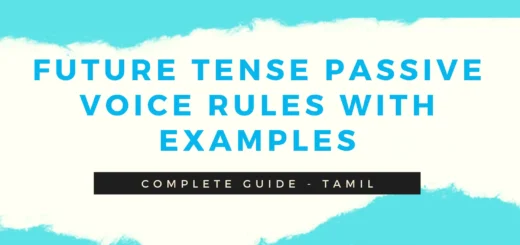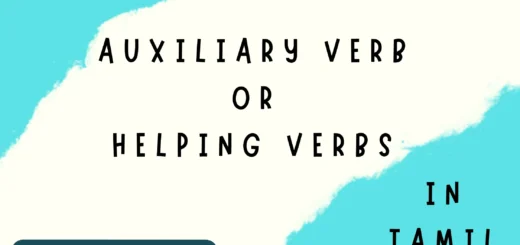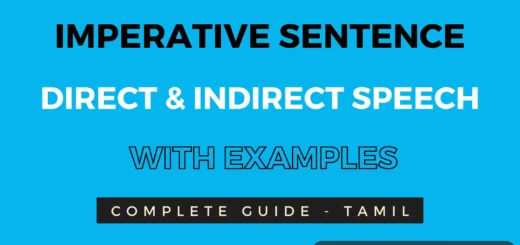All 4 future tenses in Tamil
Learn future tense in Tamil. இப்போது நாம் 4 வகையான future tense என்னென்ன அவற்றினை எப்படி வினா வாக்கியம் மற்றும் எதிர்மறை வாக்கியமாக மாற்றுபவது என அனைத்தும் எடுத்துக்காட்டுகளுடன் முழுமையாக ஐ பற்றி காண்போம்.
future tense ஆனது எதிர்காலத்தில் நடக்க இருக்கும் நிகழ்வுகளை verb இன் துணையுடன் குறிப்பிட உதவுகிறது.
இந்த future tense ஆனது verb ஐ பொறுத்து 4 வகைகளாக பிரிக்கப்பட்டுள்ளது.
- The Simple Future Tense
- The Future Continuous Tense
- The Future Perfect Tense
- The Future Perfect Continuous Tense
இந்த 4 வகைகளையும் ஒவ்வொன்றாக கீழே காண்போம்.
The Simple Future Tense
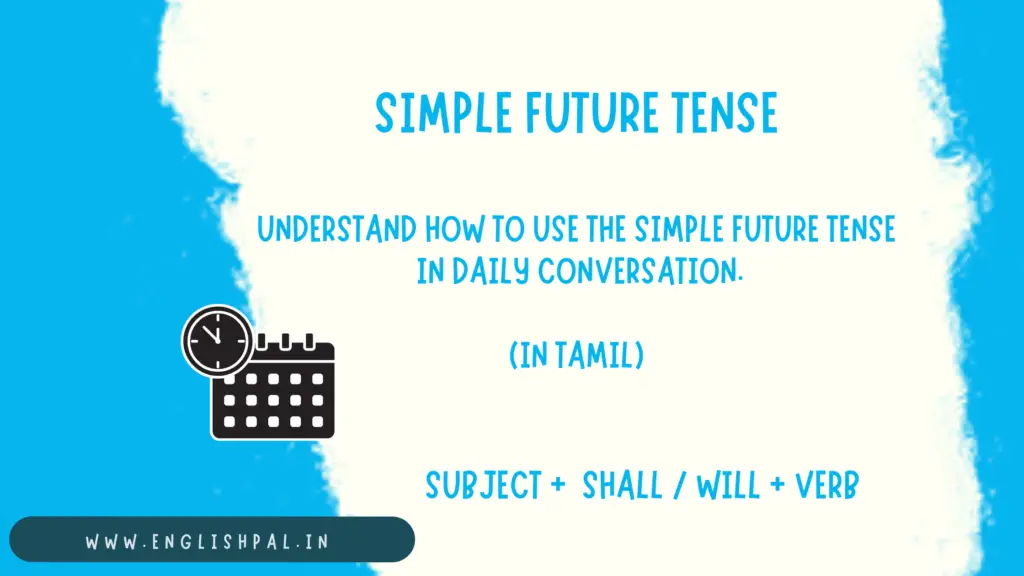
ஒரு செயலானது எதிர்காலத்தில் நடப்பதைக் குறிப்பிட simple future tense உதவுகிறது.
simple future tense இல் நாம் எதிர்காலத்தில் தொடங்கி எதிர்காலத்தில் முடியும் செயல்களை மட்டுமே உபயோகப்படுத்த வேண்டும்.
Examples of the simple future tense
- I shall go to the movies tomorrow. – நான் நாளை திரைப்படத்துக்கு செல்கிறேன்.
- I shall try. – நான் முயற்சி செய்கிறேன்.
- He will finish his job this week. – அவன் இந்த வாரம் அவனுடைய வேலையை முடிப்பான்.
The simple future tense formula
Subject + Shall / will + verb.
| Subject | shall / will | verb |
| I / we | Shall | verb |
| You / They/ He / She / It / Name | Will | verb |
The simple future tense examples
- I will/shall dance in tomorrow’s competition.- நாளைய போட்டியில் நான் ஆடுவேன்.
- We will/shall see the movie at the theater. – நாங்கள் இந்த படத்தை திரை அரங்கில் பார்ப்போம்.
- You will write a letter to your superiors. – நீ உனது மேலதிகாரிகளுக்கு கடிதம் எழுதுவாய்.
- They will make you laugh. – அவர்கள் உன்னை சிரிக்க வைப்பார்கள்.
- He will draw very neatly. – அவன் மிக தெளிவாக வரைவான்.
- She will prepare a meal for you for today’s dinner. – உங்களுக்காக அவள் இன்றைய இரவு உணவை சமைப்பாள்.
- It will fly higher. – அது உயரமாக பறக்கும்.
- Haran will try to help you solve this problem. – கரன் உங்களுடைய பிரச்சனைக்கு தீர்வு காண முயற்சி செய்வான்.
The simple future negative formula
Subject + Shall not / will not + verb.
| Subject | shall not / will not | verb |
| I / we | Shall not | verb |
| You / They/ He / She / It / Name | Will not | verb |
Examples of the simple future negative form
- I will/shall not dance in tomorrow’s competition. – நாளைய போட்டியில் நான் ஆட மாட்டேன்.
- We will/shall not see the movie at the theater. – நாங்கள் இந்த படத்தை திரை அரங்கில் பார்க்க மாட்டோம்.
- You will not write a letter to your superiors. – நீ உனது மேலதிகாரிகளுக்கு கடிதம் எழுத மாட்டாய்.
- They will not make you laugh. – அவர்கள் உன்னை சிரிக்க வைக்க மாட்டார்கள்.
- He will not draw very neatly. – அவன் மிக தெளிவாக வரைய மாட்டான்.
- She will not prepare a meal for you for today’s dinner. – உங்களுக்காக அவள் இன்றைய இரவு உணவை சமைக்க மாட்டாள்.
- It will not fly higher. – அது உயரமாக பறக்காது.
- Haran will not try to help you solve this problem. – கரன் உங்களுடைய பிரச்சனைக்கு தீர்வு காண முயற்சிக்க மாட்டான்.
The simple future interrogative formula
Shall / will + Subject + verb + object
| shall / will | Subject | verb |
| Shall | I / we | verb |
| Will | You / They/ He / She / It / Name | verb |
Examples of the simple future interrogative formula
- Shall I dance in tomorrow’s competition? – நாளைய போட்டியில் நான் ஆடுவேனா?
- Shall we see the movie at the theater? – நாங்கள் இந்த படத்தை திரை அரங்கில் பார்ப்போமா?
- Will you write a letter to your superiors? – நீ உனது மேலதிகாரிகளுக்கு கடிதம் எழுதுவாயா?
- Will they make you laugh? – அவர்கள் உன்னை சிரிக்க வைப்பார்களா?
- Will he draw very neatly? – அவன் மிக தெளிவாக வரைவானா?
- Will she prepare a meal for you for tonight’s dinner? – உங்களுக்காக அவள் இன்றைய இரவு உணவை சமைப்பாளா?
- Will it fly higher? – அது உயரமாக பறக்குமா?
- Will Haran try to help you solve this problem? – கரன் உங்களுடைய பிரச்சனைக்கு தீர்வு காண முயற்சி செய்வானா?
வார்த்தை சுருக்கங்கள்
- Shall not-shan’t
- Will not- won’t
- I shall-I’ll
- We shall-we’ll
- You will-you’ll
- They will-they’ll
- He will-he’ll
- She will – she’ll
- It will-it’ll
Going to
எதிர்காலத்தை பற்றி குறிப்பிடும்போது “going to” வை உபயோக்கிக்கலாம்.
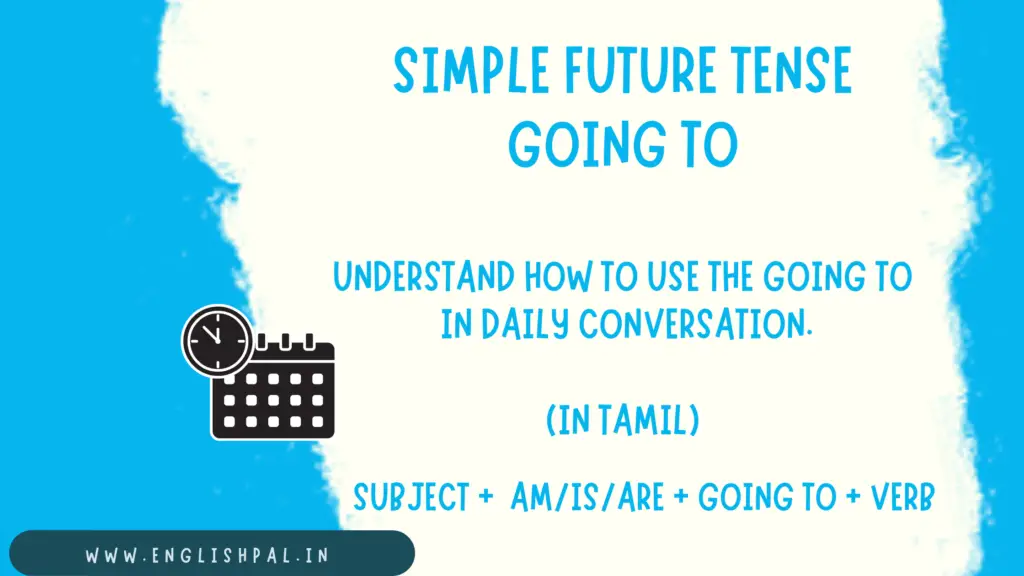
examples of going to
- I am going to watch this movie today. – நான் இன்று இந்த திரைப்படத்தை பார்க்கப்போகிறேன்.
- He is going to cook today. – இன்று அவன் சமைக்கப்போகிறான்.
- You are going to win today’s match. – நீ இன்றைய போட்டியில் வெற்றி பெறுவாய்.
going to form
Subject + am / is / are + going to + verb + object.
| Subject | am / is / are | going to | verb |
| I | am | going to | verb |
| we / you / they | are | going to | verb |
| he / she / it / name | is | going to | verb |
Examples of going to form
- I am going to ask for help from my brother. – எனது சகோதரனிடம் உதவிகேட்கப் போகிறேன்.
- We are going to move from Coimbatore next week. – நாம் அடுத்த வாரம் கோவையிலிருந்து கிளம்பப் போகிறோம்.
- You are going to sleep well tonight. – நீ இன்று இரவு நன்றாக உறங்குவாய்.
- They are going to make you happy. – அவர்கள் உன்னை மகிழ்ச்சியாக வைக்கப்போகிறார்கள்.
- He is going to find a new solution to this problem. – அவன் இந்த பிரச்சனைக்கு புதிய தீர்வினை காணப்போகிறான்.
- She is going to meet my friend after this party. – இந்த விருந்து முடிந்ததும் அவள் என் நண்பனை சந்திக்கப் போகிறாள்.
- It is going to hide in the dark. – அது இருட்டில் ஒளிந்துகொள்ளப் போகிறது.
- Haran is going to finish his homework after dinner. – இரவு உணவுக்குப் பிறகு கரன் வீட்டுப்பாடத்தை முடிக்கப் போகிறான்.
going to Negative form
Subject + am / is / are + not + going to + verb + object.
| Subject | am not / is not / are not | going to | verb |
| I | am not | going to | verb |
| we / you / they | are not | going to | verb |
| he / she / it / name | is not | going to | verb |
Examples of negative form
- I am not going to ask for help from my brother. – எனது சகோதரனிடம் உதவிகேட்கப் போவதில்லை.
- We are not going to move from Coimbatore next week. – நாம் அடுத்த வாரம் கோவையிலிருந்து கிளம்பப் போவதில்லை.
- You are not going to sleep well tonight. – நீ இன்று இரவு நன்றாக உறங்கப்போவது இல்லை.
- They are not going to make you happy. – அவர்கள் உன்னை மகிழ்ச்சியாக வைக்கப்போவதில்லை.
- He is not going to find a new solution to this problem. – அவன் இந்த பிரச்சனைக்கு புதிய தீர்வினை காணப்போவதில்லை.
- She is not going to meet my friend after this party. – இந்த விருந்து முடிந்ததும் அவள் என் நண்பனை சந்திக்கப் போவதில்லை.
- It is not going to hide in the dark. – அது இருட்டில் ஒளிந்துகொள்ளப் போவதில்லை.
- Haran is not going to finish his homework after dinner. – இரவு உணவுக்குப் பிறகு கரன் வீட்டுப்பாடத்தை முடிக்கப் போவதில்லை.
Going to Interrogative form
am / is / are + Subject + going to + verb + object.
| am / is / are | Subject | going to | verb |
| am | I | going to | verb |
| are | we / you / they | going to | verb |
| is | he / she / it / name | going to | verb |
Examples of interrogative form
- Am I going to ask for help from my brother? – எனது சகோதரனிடம் உதவிகேட்கப் போகிறேனா?
- Are we going to move from Coimbatore next week? – நாம் அடுத்த வாரம் கோவையிலிருந்து கிளம்பப் போகிறோமா?
- Are you going to sleep well tonight? – நீ இன்று இரவு நன்றாக உறங்குவாயா?
- Are they going to make you happy? – அவர்கள் உன்னை மகிழ்ச்சியாக வைக்கப்போகிறார்களா?
- Is he going to find a new solution to this problem? – அவன் இந்த பிரச்சனைக்கு புதிய தீர்வினை காணப்போகிறானா?
- Is she going to meet my friend after this party? – இந்த விருந்து முடிந்ததும் அவள் என் நண்பனை சந்திக்கப் போகிறாளா?
- Is it going to hide in the dark? – அது இருட்டில் ஒளிந்துகொள்ளப் போகிறதா?
- Is Haran going to finish his homework after dinner? – இரவு உணவுக்குப் பிறகு கரன் வீட்டுப்பாடத்தை முடிக்கப் போகிறானா?
The Future Continuous Tense
எதிர்காலத்தில் ஒரு செயலானது தொடங்கி அது குறிப்பிட்ட காலம் வரை நிகழ்வதைக் குறிப்பிட future progressive tense or Future Continuous Tense உதவுகிறது.
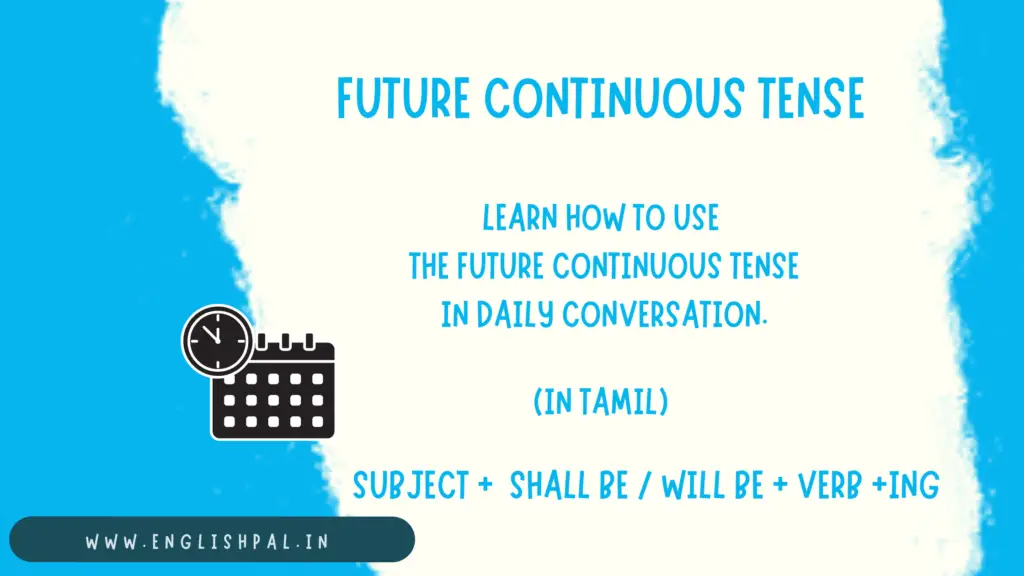
இதனை நாம் future progressive tense எனவும் கூறலாம்.
Examples of the future continuous tense
1. I will reach the theater – this is simple future tense.
நான் திரை அரங்குக்கு செல்வேன் என்பது simple future tense.
2. I will be meeting my friends in the theater before watching a movie.– this is the future continuous tense.
நான் திரையரங்கில் படம் பார்ப்பதற்கு முன்பு நண்பர்களுடன் கலந்து உரையாடுவேன் என்பது future continuous tense.
The future continuous tense formula
Subject + shall be / will be + verb +ing + object.
| Subject | shall be / will be | verb +ing | object |
| I / we | shall be / will be | verb + ing | object |
| you / they | will be | verb + ing | object |
| he / she / it / name | will be | verb + ing | object |
Examples of the future continuous tense formula
- I shall be waiting for you. – நான் உனக்காக காத்துக்கொண்டு இருப்பேன்.
- We shall be finishing this task tomorrow. – நாங்கள் நாளை இந்த பணியினை முடித்து இருப்போம்.
- You will be playing in today’s match. – இன்றைய போட்டியில் நீ விளையாடுவாய்.
- They will be cheering for your performance. – உன்னுடைய திறமைக்காக அவர்கள் உற்சாகப்படுத்துவார்கள்.
- He will be watching your activities closely. – அவன் உன்னுடைய செயல்களை கவனித்து வருவான்.
- She will be playing against the world’s number one player. – அவள் உலகின் முன்னணி வீராங்கனைக்கு எதிராக விளையாடுவாள்.
- It will be moving from north to south tomorrow. – நாளை இது வடக்கிலிருந்து தெற்கு நோக்கி நகரும்.
- Haran will be celebrating India’s victory after winning the match. – கரன் போட்டிக்குப் பிறகு இந்தியாவின் வெற்றியை கொண்டாடுவான்.
The future continuous negative formula
Subject + shall + not + be / will + not + be + verb +ing + object.
| Subject | shall not be / will not be | verb +ing | object |
| I / we | shall not be / will not be | verb + ing | object |
| you / they | will not be | verb + ing | object |
| he / she / it / name | will not be | verb + ing | object |
Examples of the future continuous negative formula
- I will not be waiting for you. – நான் உனக்காக காத்திருக்க மாட்டேன்.
- We shall not be finishing this task tomorrow. – நாங்கள் நாளை இந்த பணியினை முடித்திருக்க மாட்டோம்.
- You will not be playing in today’s match. – இன்றைய போட்டியில் நீ விளையாட மாட்டாய்.
- They will not be cheering for your performance. – உன்னுடைய திறமைக்காக அவர்கள் உற்சாகப்படுத்த மாட்டார்கள்.
- He will not be watching your activities closely. – அவன் உன்னுடைய செயல்களை கவனிக்க மாட்டான்.
- She will not be playing against the world’s number one player. – அவள் உலகின் முன்னணி வீராங்கனைக்கு எதிராக விளையாட மாட்டாள்.
- It will not be moving from north to south tomorrow. – நாளை இது வடக்கிலிருந்து தெற்கு நோக்கி நகராது.
- Haran will not be celebrating India’s victory after winning the match. – கரன் போட்டிக்குப் பிறகு இந்தியாவின் வெற்றியை கொண்டாட மாட்டான்.
The future continuous interrogative formula
Shall / Will + subject + be + verb + ing + object?
| shall / will | Subject | be | verb +ing | object |
| shall be / will be | I / we | be | verb + ing | object |
| will be | you / they | be | verb + ing | object |
| will be | he / she / it / name | be | verb + ing | object |
Examples of the future continuous interrogative formula
- Shall I be waiting for you? – நான் உனக்காக காத்துக்கொண்டு இருப்பேனா?
- Shall we be finishing this task tomorrow? – நாங்கள் நாளை இந்த பணியினை முடித்து இருப்போம்.
- Will you be playing in today’s match? – இன்றைய போட்டியில் நீ விளையாடுவாயா?
- Will they be cheering for your performance? – உன்னுடைய திறமைக்காக அவர்கள் உற்சாகப்படுத்துவார்களா?
- Will he be watching your activities closely? – அவன் உன்னுடைய செயல்களை கவனித்து வருவானா?
- Will she be playing against the world’s number one player? – அவள் உலகின் முன்னணி வீராங்கனைக்கு எதிராக விளையாடுவாளா?
- Will It be moving from north to south tomorrow? – நாளை இது வடக்கிலிருந்து தெற்கு நோக்கி நகருமா?
- Will Haran be celebrating India’s victory after winning the match? – கரன் போட்டிக்குப் பிறகு இந்தியாவின் வெற்றியை கொண்டாடுவானா?
Prefix and suffix, Voice, Conjunctions, Preposition, Articles பற்றி அறிய
Prefix and suffix in Tamil with examples
Active and Passive voice in Tamil
Conjunctions (இணைப்புச் சொற்கள்) with Examples in Tamil
The Future Perfect Tense
ஒரு செயலானது எதிர்காலத்தில் ஒரு குறிப்பிட்ட நேரத்தில் நடந்து முடிந்திருக்கும் என கூறும் இடங்களில் the future perfect tense உதவுகிறது.
ஒரு வாக்கியத்தில் குறிப்பிட்ட காலவரையறையைக் கொண்டு முடியுமானால் நாம் future perfect tense உபயோக்கிக்க வேண்டும். இல்லையெனில் simple future tense போதுமானது.
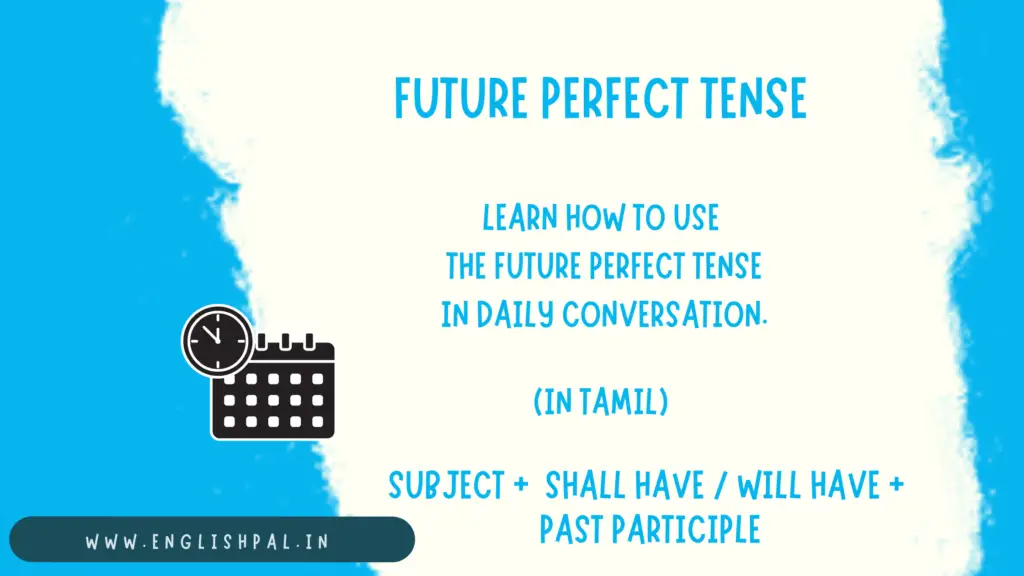
Examples of the future perfect tense
Example 1
Imagine this situation,
You plan to resign your job from your current company and refer your friend for your position. Your friend attends the interview and gets the job. And your friend is asking when you will resign so he can join your company.
You can answer him like, “By the time you join here, I will have resigned.”
நீங்கள் உங்கள் வேலையை விட்டு விட முடிவு செய்துவிட்டீர்கள். உங்கள் பணியை உங்கள் நண்பருக்கு பரிந்துரை செய்கிறேர்கள். அவரும் நேர்முகத்தேர்வில் வெற்றி பெற்று விடுகிறார். அவருக்கு நீங்கள் வேலையை விட்டு சென்றதும் பணி கிடைக்கும். உங்கள் நண்பர் உங்களிட எப்பொழுது வேலையை விட்டு செல்வாய் என கேட்கும் போது நீங்கள், “நீ வேலையில் சேரும்போது நான் பதவியில் இருந்து விலகி இருப்பேன்” என கூறலாம்.
Example 2
Imagine this
You planned to go to Goa with your friends. Tomorrow night you have a flight. Your friends ask about the dinner before getting on the flight.
You can answer them like
I will have eaten my dinner before I get to the airport tomorrow night.
நீங்கள் உங்கள் நண்பர்களுடன் கோவா செல்ல திட்டமிட்டு உள்ளீர்கள். நாளை இரவு கோவாவுக்கு விமானம் பதிவு செய்யப்பட்டுள்ளது. உங்கள் நண்பர்கள் நாளை இரவு உணவு பற்றி கேட்கிறார்கள். நீங்கள் அதற்கு “நான் விமான நிலையம் வருவதற்கு முன்பே இரவு உணவை முடித்திருப்பேன்” என கூறலாம்.
இவ்வாறு எதிர்காலத்தில் ஒரு குறிப்பிட்ட நேரத்தில் நடந்து முடிந்திருக்கும் சூழ்நிலைகளில் future perfect tense உதவுகிறது.
The future perfect tense formula
Subject + shall have / will have + past participle + object
| Subject | shall have / will have | past participle | object |
| I / we | shall have/ will have | past participle | object |
| you / they | will have | past participle | object |
| he / she / it / name | will have | past participle | object |
Examples of the future perfect tense formula
- I shall have had dinner before the meeting. – கூட்டத்திற்கு முன்பு நான் என்னுடைய இரவு உணவை முடித்து இருப்பேன்.
- We shall have asked him again to sing the song before ending the concert. – கச்சேரியை முடிக்கும் முன்பு மீண்டும் அந்த பாடலை பாடும்படி கேட்டிருப்போம்.
- You will have called him at the end of the day. – நீ இன்றைய நாள் முடிவில் அவரை அழைத்திருப்பாய்.
- By the time you watch this movie, they will have left. – நீங்கள் அந்த திரைப்படத்தைப் பார்க்கும் போது நாங்கள் கிளம்பி இருப்போம்.
- He will have seen the whole movie before I arrive there. – நான் அங்கு வருவதற்கு முன்பு அவன் முழு படத்தையும் பார்த்திருப்பான்.
- She will have left at 11 a.m. – அவள் காலை 11 மணிக்கி கிளம்பி இருப்பாள்.
- It will have taken longer than the previous one. – இது முந்தையதை விட அதிக நேரம் எடுத்து இருக்கும்.
- Haran will have arrived in the evening. – கரன் மாலையில் வந்திருப்பான்.
the future perfect negative formula
Subject + shall not have / will not have + past participle + object
| Subject | shall not have / will not have | past participle | object |
| I / we | shall not have/ will not have | past participle | object |
| you / they | will not have | past participle | object |
| he / she / it / name | will not have | past participle | object |
Examples of the future perfect negative formula
- I shall not have had dinner before the meeting. – கூட்டத்திற்கு முன்பு நான் என்னுடைய இரவு உணவை முடித்து இருக்க மாட்டேன்.
- We shall not have asked him to sing the song before ending the concert. – கச்சேரியை முடிக்கும் முன்பு மீண்டும் அந்த பாடலை பாடும்படி கேட்டிருக்க மாட்டோம்.
- You will not have called him at the end of the day. – நீ இன்றைய நாள் முடிவில் அவரை அழைத்திருக்க மாட்டாய்.
- By the time you watch this movie, they will not have left. – நீங்கள் அந்த திரைப்படத்தைப் பார்க்கும் போது நாங்கள் கிளம்பி இருக்க மாட்டோம்.
- He will not have seen the whole movie before I arrive there. – நான் அங்கு வருவதற்கு முன்பு அவன் முழு படத்தையும் பார்த்திருக்க மாட்டான்.
- She will not have left at 11 a.m. – அவள் காலை 11 மணிக்கி கிளம்பி இருக்க மாட்டாள்.
- It will not have taken longer than the previous one. – இது முந்தையதை விட அதிக நேரம் எடுத்து இருக்காது.
- Haran will not have arrived in the evening. – கரன் மாலையில் வந்திருக்க மாட்டான்.
The future perfect interrogative formula
shall / will + Subject + have + past participle + object
| shall / will | Subject | have | past participle | object |
| shall / will | I / we | have | past participle | object |
| will | you / they | have | past participle | object |
| will | he / she / it / name | have | past participle | object |
Examples of the future perfect interrogative formula
- Shall I have had dinner before the meeting? – கூட்டத்திற்கு முன்பு நான் என்னுடைய இரவு உணவை முடித்து இருப்பேனா?
- Shall we have asked him to sing the song before ending the concert? – கச்சேரியை முடிக்கும் முன்பு மீண்டும் அந்த பாடலை பாடும்படி கேட்டிருப்போமா?
- Will you have called him at the end of the day? – நீ இன்றைய நாள் முடிவில் அவரை அழைத்திருப்பாயா?
- By the time you watch this movie, will they have left? – நீங்கள் அந்த திரைப்படத்தைப் பார்க்கும் போது நாங்கள் கிளம்பி இருப்போமா?
- Will he have seen the whole movie before I arrive there? – நான் அங்கு வருவதற்கு முன்பு அவன் முழு படத்தையும் பார்த்திருப்பானா?
- Will she have left at 11 a.m.? – அவள் காலை 11 மணிக்கி கிளம்பி இருப்பாளா?
- Will it have taken longer than the previous one? – இது முந்தையதை விட அதிக நேரம் எடுத்து இருக்குமா?
- Will Haran have arrived in the evening? – கரன் மாலையில் வந்திருப்பானா?
The Future Perfect Continuous Tense
ஒரு செயலானது எதிர்காலத்தில் குறிப்பிட்ட நேரம் வரை நீடிக்கும் என குறிப்பிட future perfect continuous tense உதவுகிறது.
அந்த செயலானது நிகழ் காலத்திலோ, இறந்த காலத்திலோ அல்லது எதிர்காலத்திலோ கூட தொடங்கி இருக்கலாம். ஆனால், அந்த செயலானது எதிர்காலத்தில் குறிப்பிட்ட நேரம் வரை நீடித்து இருக்க வேண்டும்.
நாம் non action verbs வரும் இடங்களில் future perfect continuous tense உபயோகிக்கக்கூடாது. அதற்கு பதிலாக future perfect tense உபயோகிக்க வேண்டும்.
examples for non action verbs
to be, to seem, to know,
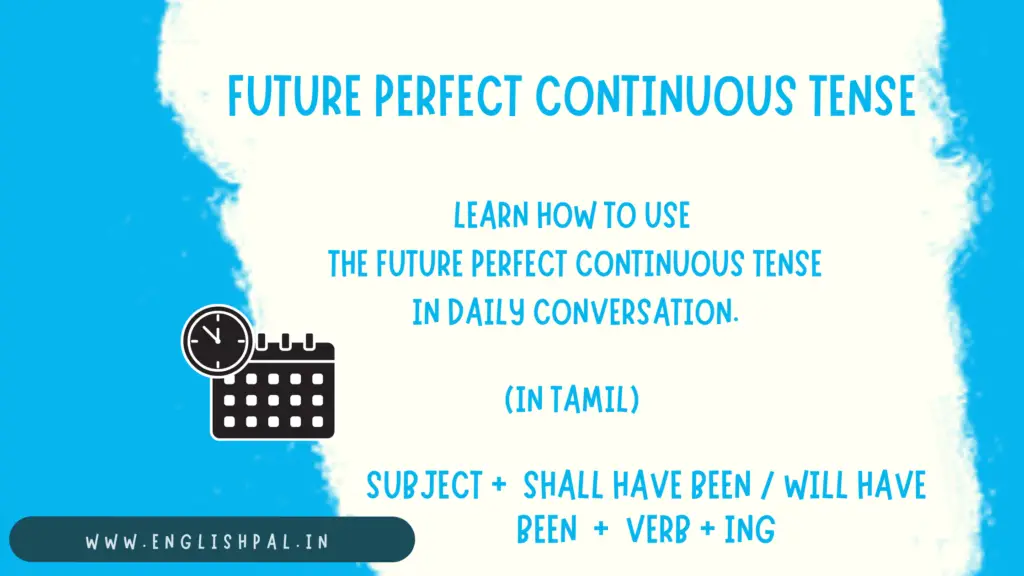
Example of the future perfect continuous tense
I will have been playing the piano for 21 years when I turn thirty.- எனக்கு முப்பது வயது ஆகும்போது நான் 21 வருடங்கள் பியானோ வாசிப்பேன்.
The future perfect continuous tense formula
Subject + shall / will + have + been + verb + ing + time reference.
| Subject | shall have been / will have been | Verb + ing | object |
| I / we | shall have been / will have been | verb + ing | object |
| you / they | will have been | verb + ing | object |
| he / she / it / name | will have been | verb + ing | object |
Examples of the future perfect continuous tense formula
- I will have been waiting for one hour at 10 o’clock. – பத்து மணியின் போது ஒரு மணி நேரம் காத்திருப்பேன்.
- We will have been playing cricket for three years in December. – டிசம்பரில் நாங்கள் மூன்று வருடங்களாக கிரிக்கட் விளையாடுவோம்.
- You will have been working here for three years next year. – அடுத்த வருடத்தில் நீங்கள் மூன்று வருடங்களாக வேலை செய்துகொண்டு இருப்பீர்கள்.
- They will have been looking at me when I started to play. – நான் விளையாடத் துவங்கும்போது அவர்கள் என்னை பார்த்துக்கொண்டு இருப்பார்கள்.
- He will have been searching for a job after graduating. – படித்து முடித்தவுடன் அவர் வேலை தேடிக்கொண்டு இருப்பார்.
- She will have been cooking a meal at 3 a.m. – காலை மூன்று மணிக்கு அவள் உணவை சமைத்துக்கொண்டு இருப்பாள்.
- It will have been moving from here at 3 o’clock. – காலை மூன்று மணிக்கு அது நகர தொடங்கி இருக்கும்.
- Haran will have been enjoying his party after his task was over. – கரன் தன் வேலை முடிந்ததும் தன் விருந்தில் மகிழ்ச்சியாக இருப்பார்.
The future perfect continuous negative formula
Subject + shall / will + not + have + been + verb + ing + time reference.
| Subject | shall not have been / will not have been | Verb + ing | object |
| I / we | shall not have been / will not have been | verb + ing | object |
| you / they | will not have been | verb + ing | object |
| he / she / it / name | will not have been | verb + ing | object |
Examples of the future perfect continuous negative formula
- I will not have been waiting for one hour at 10 o’clock. – பத்து மணியின் போது ஒரு மணி நேரம் காத்திருக்க மாட்டேன்.
- We will not have been playing cricket for three years in December. – டிசம்பரில் நாங்கள் மூன்று வருடங்களாக கிரிக்கட் விளையாட மாட்டோம்.
- You will not have been working here for three years next year. – அடுத்த வருடத்தில் நீங்கள் மூன்று வருடங்களாக வேலை செய்துகொண்டு இருக்க மாட்டீர்கள்.
- They will not have been looking at me when I started to play. – நான் விளையாடத் துவங்கும்போது அவர்கள் என்னை பார்த்துக்கொண்டு இருக்க மாட்டார்கள்.
- He will not have been searching for a job after graduating. – படித்து முடித்தவுடன் அவர் வேலை தேடிக்கொண்டு இருக்க மாட்டார்.
- She will not have been cooking a meal at 3 a.m. – காலை மூன்று மணிக்கு அவள் உணவை சமைத்துக்கொண்டு இருக்க மாட்டாள்.
- It will not have been moving from here at 3 o’clock. – காலை மூன்று மணிக்கு அது நகர தொடங்கி இருக்காது.
- Haran will not have been enjoying his party after his task was over. – கரன் தன் வேலை முடிந்ததும் தன் விருந்தில் மகிழ்ச்சியாக இருக்க மாட்டார்.
The future perfect continuous interrogative formula
shall / will + subject + have + been + verb + ing + time reference.
| shall / will | Subject | have been / have been | Verb + ing | object |
| Shall | I / we | have been / have been | verb + ing | object |
| Will | you / they | have been | verb + ing | object |
| Will | he / she / it / name | have been | verb + ing | object |
Examples of the future perfect continuous interrogative formula
- Shall I have been waiting for one hour at 10 o’clock? – பத்து மணியின் போது ஒரு மணி நேரம் காத்திருக்க வேண்டுமா?
- Shall we have been playing cricket for three years in December? – டிசம்பரில் நாங்கள் மூன்று வருடங்களாக கிரிக்கட் விளையாடி இருப்போமா?
- Will you have been working here for three years next year? – அடுத்த வருடத்தில் நீங்கள் மூன்று வருடங்களாக வேலை செய்துகொண்டு இருப்பீர்களா?
- Will they have been looking at me when I started to play?
- நான் விளையாடத் துவங்கும்போது அவர்கள் என்னை பார்த்துக்கொண்டு இருப்பார்களா?
- Will he have been searching for a job after graduating? – படித்து முடித்தவுடன் அவர் வேலை தேடிக்கொண்டு இருப்பாரா?
- Will she have been cooking a meal at 3 a.m.? – காலை மூன்று மணிக்கு அவள் உணவை சமைத்துக்கொண்டு இருப்பாளா?
- Will it have been moving from here at 3 o’clock? – காலை மூன்று மணிக்கு அது நகர தொடங்கி இருக்குமா?
- Will Haran have been enjoying his party after his task was over? – கரன் தன் வேலை முடிந்ததும் தன் விருந்தில் மகிழ்ச்சியாக இருப்பாரா?
Tense பற்றி அறிய
All 12 Tenses in Tamil with examples
Conclusion
நாம் பதிவின் தொடக்கத்தில் கூறியவாறே, அணைத்து எதிர்கால வாக்கியங்களை பற்றியும், அவற்றின் எதிர்மறை, மற்றும் வினா வாக்கியங்களை பற்றி விரிவாக பார்த்தோம். இந்த பதிவானது future tense பற்றிய தெளிவான புரிதலை தந்திருக்கும் என நம்புகிறேன். மேலும் நமது மற்ற இலக்கணப் பிரிவுகளை தெரிந்துகொள்ள நமது பதிவுகளை படிக்கவும்.
உங்கள் கருத்துக்களை நாங்கள் அறிந்துகொள்ள விரும்புகிறோம். இது எங்களுக்கு மேலும் பல பதிவுகளை எழுத ஊக்குவிக்கும். எனவே உங்கள் கருத்துக்களை comment இல் பதிவு செய்யவும்.
இந்த future tense பற்றி ஏதேனும் சந்தேகங்கள் இருப்பின் அதனை comment செய்யுங்கள். நாங்கள் பதில் அளிக்கிறோம்.
நன்றி! வாழ்த்துக்களும் அன்புகளும்!

